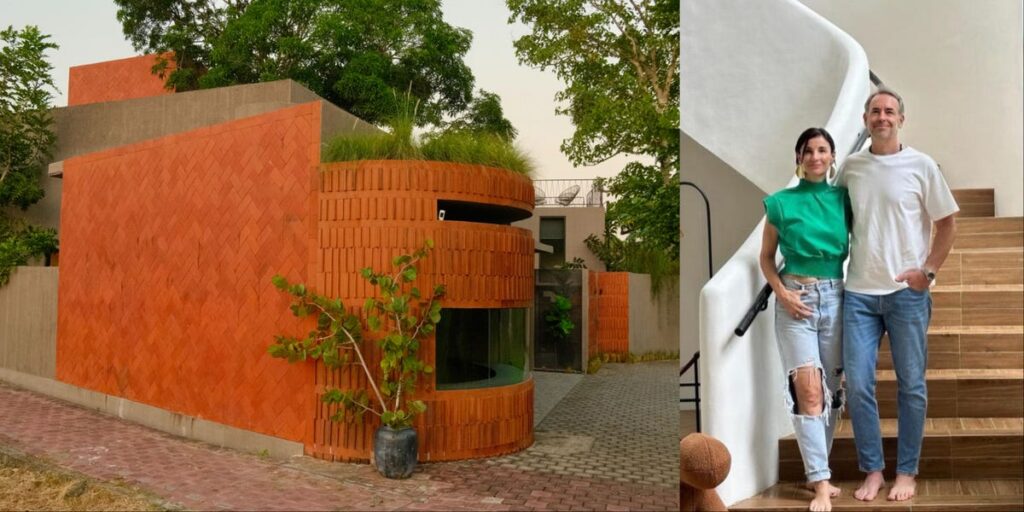Seven years ago, Gabi Bondor and Zoltan Kaman packed up their lives and moved from New York City to Bali with their two teenage sons in tow.
It was an idea sparked by a conversation with a friend over coffee on a cold winter morning.
The friend had mentioned his plans to enroll his daughters in the Green School, which is made from eco-friendly bamboo buildings and is known for its sustainability-focused pre-kindergarten through high school curriculum. It’s also located in Ubud, over 10,000 miles from New York, near the center of the Indonesian island.
“And while we had traveled to places like India, Vietnam, and China, we’d never been to Indonesia before. So I said, ‘Bali, that sounds very warm. Tell me more,'” Bondor told Business Insider.
When they got home, they started researching what life in Bali was like.
“I looked at the school, and it was the opposite of what was happening to my children in high school in New York. When the kids got home that day, I said, ‘Guys, we’re going to Bali for spring break,'” Bondor said.
The spring break visit came and went, and the couple decided they wanted to experience what it was like to live on the island for longer.
They ended up selling their kids the idea of a yearlong sabbatical in Bali as a break from stressful city life and a chance to see the rest of Asia.
“We told them, ‘One suitcase each. Everything else goes into storage because we’d be back in a year,'” Bondor added. “Although they were allowed to bring their Xbox in their carry-on.”
But after their year in Bali passed, the couple realized they didn’t want to leave. They made a trip back to the US to clear out their storage and have no plans to move back.
The friend who introduced them to Bali didn’t make the move in the end, she added.
Building in Bali
Like many expats, the couple rented a few different homes in Bali before finally building their own house during the pandemic.
“When COVID-19 came, land prices were a lot more affordable than what it is today, so we decided that we were going to purchase a plot somewhere where we could create a space for our family,” Bondor said.
Part of the reason they chose to build instead of buying an off-plan property or continuing to rent was so that they could ensure the quality of the build, Kaman, the cofounder of a digital payment app, told BI.
“We always had some issue or another with the homes — the pump, the AC — and the landlords don’t always care,” Kaman said. “We thought, ‘Why don’t we build something ourselves so at least we can control and make sure that everything is working the way we need?'”
Additionally, they had experience renovating their homes during their time in the US. It helped that they also had a great team of builders — recommended by a friend — to rely on too.
“We love the process,” Bondor said. “We enjoy it. I think we’re a great team. If he is down or pissed, I pick him up, and vice versa.”
They knew they wanted to stay near Canggu which is known for its beaches and bustling food scene.
“We lived in the neighborhood and we had always scouted around. Many people like the rice field views, while others like the beach views. We are social people — we like our coffee shops,” Bondor said.
When the couple first saw the plot, located at the end of a narrow street that branches off from the main road, they fell in love immediately.
“It was so quiet and peaceful. There was nothing, except for basically seven big mango trees and thick vegetation. It was like a mini jungle,” Kaman said.
The plot was about 8,200 square feet. Since foreigners aren’t allowed to own land in Bali, the piece of land they have is on a 30-year lease.
The entire construction process took slightly over a year to complete, and the couple lived in a rented home nearby so they could always be on-site.
The biggest challenge they faced was having to work through Bali’s rainy season, which typically runs from November to March.
“We started digging a pool when it was the rainy season, and we were just digging mud,” Bondor said. “For weeks and weeks, you didn’t see the digger come out of the soil — it felt like we weren’t getting anywhere.”
A cozy, eclectic home
The couple’s six-bedroom home sits in a cul-de-sac, next to a rice field that’s been repurposed into a plot to grow cucumbers.
The two-story building — which comes with an accessory dwelling unit that the couple calls “the teenager pad” — has a red and gray exterior that stands out in contrast to the surrounding greenery.
Those who step beyond the gate are greeted by a long walkway flanked by two koi ponds that lead to the main building.
“I like to say that it has a lot of European charm, like Paris with New York dancing a tango kind of thing. I really wanted to incorporate a lot of Balinese elements as well,” Bondor said.
The furniture is handmade in Indonesia, and even the terracotta tiles on the building’s exterior were crafted by a local family, she added.
Most importantly, it’s a house that they designed with their own living habits in mind.
“I think everything, from the kitchen layout to the lighting, is based on the way we live our everyday life,” Bondor said.
Becoming empty nesters
But the couple has decided it’s time to say goodbye to their house — they’re putting the villa on the market for $1.895 million.
Their oldest son is already studying abroad, and the youngest will start college soon. The couple plans to downsize to a smaller place.
“He just graduated last weekend. It’s really hit us hard that he’s leaving very soon and we’re going to have this big, empty house to ourselves,” Kaman said.
Moreover, as empty-nesters, they plan to travel a bit more now that they have the freedom to, and a house of this size can’t be left empty in tropical weather for too long.
“It’s not four seasons, it’s always a lot of rain. The sun is always strong. It wears materials out,” Bondor said. “We have animals. If one little gecko dies here and nobody cleans for a day or two, the ants will come.”
“This house needs a lot of care and maintenance. So if you’re not here for months, this is not going to work,” Kaman added.
However, Bali will always be their home base.
The slower pace of life on the island lets them stop and appreciate the little things in their day, like being able to work out in the mornings or have a nice lunch together.
That aside, Bali is a melting pot of different cultures, and its people never fail to inspire them.
“There’s a very unique expat community that comes to Bali and I think our friends have very similar mindsets that we do,” Bondor said.
The couple has one tip for those who want to build a house in Bali: Don’t cut corners.
“Do it the right way, and always respect your team,” Bondor said. “Don’t use cheap materials because this weather is going to wear everything out. If your roof is not done well, this rain is going to find its way in.”
Kaman added that it might not be wise for anyone without any prior experience to take on such an ambitious project.
“If they don’t have experience building houses, don’t start with Bali,” he said. “Just pick the right contractors.”
Have you recently built or renovated your dream home? If you’ve got a story to share, get in touch with me at agoh@businessinsider.com.
Read the full article here
















